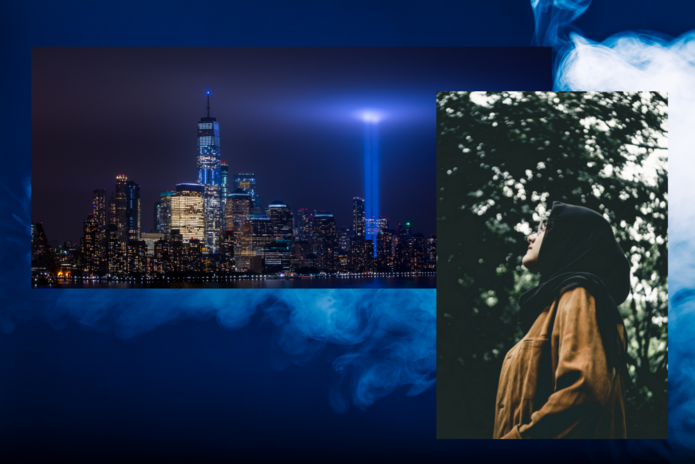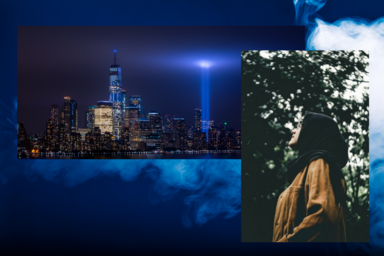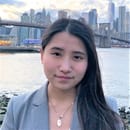Afsana, 28, born and raised in Sunnyside, Queens, still remembers the xenophobia that came after September 11. “I remember being a young girl on the train and getting stared at, even weeks and months after the attack,” she tells Her Campus. “I was too young to really understand why, but I now know it was because of my hijab and skin. I’d never gotten stared at like that.” Then Afsana’s parents told her about the attack. “I am nothing like those terrorists,” she says.
September 9 marks the 20th anniversary of 9/11, when four coordinated terrorist attacks were carried out by militant terrorist group al-Qaeda on American soil. As a result of the attacks, 2,977 lives were lost that day, including 2,574 civilians and 403 first responders – not to mention those that have died or will die due to inhalation. 9/11 was a moment of deep sadness for all Americans, who grappled with our vulnerability and loss as a nation. But for Middle Eastern Americans, it was also a time of grief for the loss of a place they could confidently – and safely – call home.
For many young people of color, 9/11 is an event that they have little to no memory of, but has played an immense part in their interactions with others. For millennials like Iman Hariri-Kia, Deputy Editor at Her Campus, their outlook on life was forever changed.
“Social studies teachers would talk about 9/11 and their classmates would look at them as if they were the ones who crashed the planes.”
“Growing up in a post 9/11 New York, I immediately felt a shift,” Iman tells Her Campus. “Friends of mine who didn’t understand the complexities of 9/11, who had family fighting in Iraq, would ask me ‘what side I was on,’ a question I didn’t fully comprehend at such a young age. I witnessed my family nervous to speak Farsi in public, scared our phones were being tapped, and strip-searched at the airport. At school, I got bullied for my appearance and culture. It took years for me to realize that the behavior of my peers was racially motivated – a form of subconscious Islamophobia.”
Iman believes that the Patriot Act, which is intended to deter, catch and punish acts of terrorism, was responsible for the resulting paranoia — and for good reason. “Propaganda around the axis of evil and radical Islam skyrocketted,” she says. “People associated the Middle East with terrorism and made cruel jokes and comments. The only representation I saw in [the] media were racist clichés. I internalized all of it, as I was too young to truly understand what was going on.” At the time, Iman had been living in downtown Manhattan and had friends who lost family in the towers. She can still remember the suffocating smoke.
For many, these young people were grieving as both Americans and as American immigrants – grieving for their fellow citizens, and because of them. Hate crimes against muslims jumped after 9/11, and have only grown since then. According to the Pew Research Center, the number of hate crimes reported to the FBI in 2016 surpassed those of 2001.
Sonam, 32, recalls hearing vicious verbal attacks as she came back home to Brooklyn from the temple in Flushing, Queens. “I was 12 years old and always felt anxious,” she tells Her Campus. “My parents didn’t let us out of the house except for school and the temple because they were worried we would get hurt. We’d heard of the attacks on Sikh men days after 9/11. I was so mad that we were being punished for something my family and friends didn’t do.”
But how can Generation Z (loosely identified as born after 1996) identify with what they see as simply history? How should this generation, shaped by an attack on U.S. soil, reflect on a traumatic event that took place before many of us were born?
Ruqaiya,19, is one of those members of Gen Z — her mother was pregnant on 9/11. “I wasn’t born until November,” she tells Her Campus. “It’s just history to me, like how we view the invention of automobiles. But history still impacts us today. I’ve been called a terrorist, in my Instagram DMs and by drunks on the street. It’s so alienating and hurtful. I’ve been back to Bangladesh once or twice in my life, but I am more American than I am anything else. Some people in this country don’t believe that, even though I was born in Brooklyn.”
“9/11 is just as sad for us, if not more – to see people who claim to kill innocent people in the name of Islam.”
Other members of Gen Z were newborns when 9/11 took place, and therefore, can’t remember the before and after impact of the attacks. Hafsan, 20, was two weeks old. “My parents tell me that the entire family — all of the relatives, even the ones you could barely name — were celebrating my birth,” she tells Her Campus. “After, they were wondering whether we would be able to make a future for ourselves, if we would have to leave. My older sisters actually have memories of the attack and said that their faith faltered momentarily, especially when they were in high school. Social studies teachers would talk about 9/11 and their classmates would look at them as if they were the ones who crashed the planes.”
For some, the memories their parents are willing to share are as close as they can get to memories of their own. Ahmed, 21, tells Her Campus that his father drove taxis in the early 2000s. He remembers when people wouldn’t get into his car after they saw his jalabiya. “It was a hard time for all of us, economically and socially,” he says. “Even though I don’t know anything more than the photographs and videos and what my family tells me, I know that my childhood would have been kinder and warmer if 9/11 had never occurred and if people weren’t racist. It’s no excuse, but I’m sure even good people were afraid of us.”
Aqsa,* 19, grew up in Valley Stream, Long Island and was born in 2002. “My family and I had nothing to do with these attacks,” she tells Her Campus. “9/11 is just as sad for us, if not more — to see people who claim to kill innocent people in the name of Islam. Real Muslims know this and it’s disgusting that people like me who go to school and are just trying to live our best lives have to put up with people’s ignorance. I didn’t even exist when it happened, yet I face the repercussions of others’ violence and bigotry.”
Twenty years after the attack, as we commemorate the tragic event, we should continue to be wary of the language we use to talk about those involved. Brown New Yorkers continue to be punished because of their faith, their articles of clothing, and the way they look. They’ve experienced as much — if not more — grief as the rest of America.
*Name has been changed.
Interviews have been edited for clarity and length.


